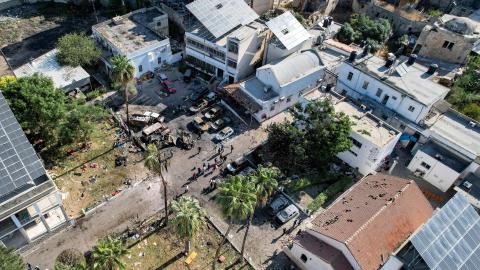Hamas’s claim that Israel intentionally bombed the Al-Ahli Hospital in Gaza on October 16 was quickly debunked by internet sleuths. But by the time U.S. and European intelligence agencies publicly refuted Hamas’ claims, Israel’s reputation had suffered significant damage. Iran and its proxies called for a “day of rage” around the globe. Public pressure forced the leaders of Jordan, Egypt, and the Palestinian Authority to cancel their meetings with President Joe Biden.
Hamas has successfully integrated disinformation operations into its terrorist campaign against Israel — and the world is watching.
Gaza has become a laboratory for other bad-faith actors, such as China, to observe and refine information warfare and gray-zone attacks. Given the gullibility the worldwide information ecosystem displayed during the Al-Ahli incident, media and policymakers need to anticipate disinformation campaigns by developing protocols to combat disinformation in real time.
The Al-Ahli incident was not the first time Palestinian groups falsified mass casualties. In 2002, a Palestinian spokesman claimed that Israel massacred over 500 men, women, and children in Jenin in the West Bank. This led to global condemnation of Israel before numerous independent groups unraveled the claims. Given this history, the Biden administration should have been proactively ready to challenge Hamas’ claims as soon as they went viral.
Disinformation as a foreign policy tool predates Hamas, of course. The Soviet Union promulgated extensive, state-driven information grey-zone strategies. It targeted fissures in Western societies through “active measures” — information campaigns designed to stimulate emotional responses. The USSR used such methods to weaken NATO unity and to attribute nefarious Western intent in the Global South.
China is now undertaking similar forms of cognitive warfare. As Josh Baughman and Peter R. Singer argue, China has learned from Palestinians how to “win international support by portraying an image of being weak and the victim.” They cite a recent article from the People’s Liberation Army newspaper that lays out social media approaches to misdirect and shape understanding of an ongoing conflict.
This tactic is evident in China’s smear campaign against Japan’s International Atomic Energy Agency (IAEA)-approved release of treated water from the Fukushima nuclear plant. Though few governments have joined Beijing in boycotting Japanese seafood, the campaign has elicited public protests in Seoul. Xi’s propaganda aims to undermine the improvement in Japan–South Korean relations. Meanwhile, Chinese vessels continue to fish in Japan’s exclusive economic zone.
With the West focused on Europe and the Middle East, Beijing has an opportunity to undertake territorial aggression against Taiwan, shoals in the South China Sea, or Japan’s Senkaku Islands. This will likely entail Chinese military and paramilitary provocations coupled with state media–driven disinformation campaigns, social media manipulation, and the use of generative AI to shape narratives at home and abroad. Given the PRC’s power, these efforts are likely to dwarf Hamas’ propaganda in both scale and frequency.
It is essential that Western media and policymakers anticipate and develop effective protocols to combat comprehensive information campaigns. As the Al-Ahli incident reinforced, reporters and officials should read any such accounts with skepticism, verify information, check sources, and refrain from making provocative pronouncements prematurely. Putting information manipulation efforts in context will enhance objective reporting.
Another more ambitious countermeasure would be the creation of an international consortium to debunk claims from known bad-faith actors. The U.S. and its partners should create mechanisms for rapid intelligence sharing and declassification to expose disinformation before it spreads. The Biden administration used this “downgrade and share” approach when it declassified evidence of Russian troop movements on the eve of the invasion of Ukraine, forestalling Russian claims of Ukrainian aggression. Formalizing this practice in the future, using images from U.S. and allied naval vessels, unmanned aerial vehicles, and satellites, could combat disinformation by proving China’s culpability for the aggression.
But the United States and its allies need to do more to prepare the broader information environment ahead of a crisis. Western nations also need to lay the predicate for this disinformation by shaming China in international institutions as a nation that does not respect the truth or regard others as equals.
Whether it be the PRC’s aggressive intimidation of Filipino fisherman in the Scarborough Shoals, to China’s constant encroachment of the Senkaku Islands, to Russia and China’s repeated and joint aerial shows of force against their neighbors, the U.S. and its partners need to do a better job laying the predicate for future Chinese aggression — and the coordinated disinformation that will accompany it.
Much of Chinese propaganda, moreover, is aimed at the Global South. Accordingly, the U.S. should undermine PRC efforts to cast itself as a champion of developing countries by highlighting China’s rapacious economic policies, its trade violations, and its oppression of national minorities, notably the Uyghurs.
These efforts would just be a start. As the global security situation grows increasingly uncertain, America’s strategic adversaries will look for opportunities to take advantage of free societies to undermine alliances and shared security. U.S. and allied media and governments need to anticipate these disinformation operations. Given the stakes, after Jenin and Al-Ahli, we have to do better.
















